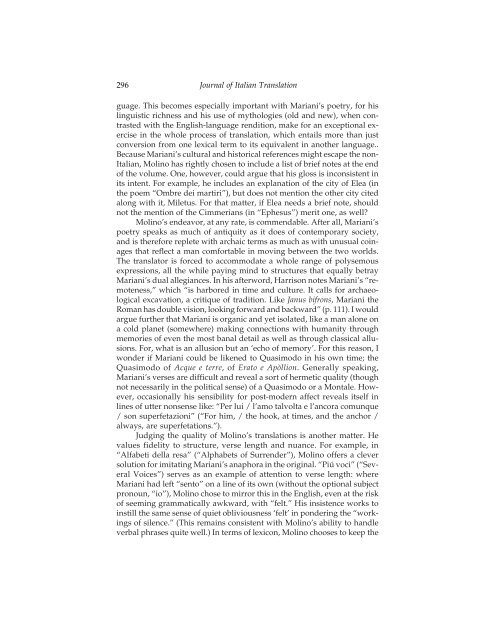Journal of Italian Translation
Journal of Italian Translation
Journal of Italian Translation
You also want an ePaper? Increase the reach of your titles
YUMPU automatically turns print PDFs into web optimized ePapers that Google loves.
296<br />
<strong>Journal</strong> <strong>of</strong> <strong>Italian</strong> <strong>Translation</strong><br />
guage. This becomes especially important with Mariani’s poetry, for his<br />
linguistic richness and his use <strong>of</strong> mythologies (old and new), when contrasted<br />
with the English-language rendition, make for an exceptional exercise<br />
in the whole process <strong>of</strong> translation, which entails more than just<br />
conversion from one lexical term to its equivalent in another language..<br />
Because Mariani’s cultural and historical references might escape the non-<br />
<strong>Italian</strong>, Molino has rightly chosen to include a list <strong>of</strong> brief notes at the end<br />
<strong>of</strong> the volume. One, however, could argue that his gloss is inconsistent in<br />
its intent. For example, he includes an explanation <strong>of</strong> the city <strong>of</strong> Elea (in<br />
the poem “Ombre dei martiri”), but does not mention the other city cited<br />
along with it, Miletus. For that matter, if Elea needs a brief note, should<br />
not the mention <strong>of</strong> the Cimmerians (in “Ephesus”) merit one, as well?<br />
Molino’s endeavor, at any rate, is commendable. After all, Mariani’s<br />
poetry speaks as much <strong>of</strong> antiquity as it does <strong>of</strong> contemporary society,<br />
and is therefore replete with archaic terms as much as with unusual coinages<br />
that reflect a man comfortable in moving between the two worlds.<br />
The translator is forced to accommodate a whole range <strong>of</strong> polysemous<br />
expressions, all the while paying mind to structures that equally betray<br />
Mariani’s dual allegiances. In his afterword, Harrison notes Mariani’s “remoteness,”<br />
which “is harbored in time and culture. It calls for archaeological<br />
excavation, a critique <strong>of</strong> tradition. Like Janus bifrons, Mariani the<br />
Roman has double vision, looking forward and backward” (p. 111). I would<br />
argue further that Mariani is organic and yet isolated, like a man alone on<br />
a cold planet (somewhere) making connections with humanity through<br />
memories <strong>of</strong> even the most banal detail as well as through classical allusions.<br />
For, what is an allusion but an ‘echo <strong>of</strong> memory’. For this reason, I<br />
wonder if Mariani could be likened to Quasimodo in his own time; the<br />
Quasimodo <strong>of</strong> Acque e terre, <strong>of</strong> Erato e Apòllion. Generally speaking,<br />
Mariani’s verses are difficult and reveal a sort <strong>of</strong> hermetic quality (though<br />
not necessarily in the political sense) <strong>of</strong> a Quasimodo or a Montale. However,<br />
occasionally his sensibility for post-modern affect reveals itself in<br />
lines <strong>of</strong> utter nonsense like: “Per lui / l’amo talvolta e l’ancora comunque<br />
/ son superfetazioni” (“For him, / the hook, at times, and the anchor /<br />
always, are superfetations.”).<br />
Judging the quality <strong>of</strong> Molino’s translations is another matter. He<br />
values fidelity to structure, verse length and nuance. For example, in<br />
“Alfabeti della resa” (“Alphabets <strong>of</strong> Surrender”), Molino <strong>of</strong>fers a clever<br />
solution for imitating Mariani’s anaphora in the original. “Piú voci” (“Several<br />
Voices”) serves as an example <strong>of</strong> attention to verse length: where<br />
Mariani had left “sento” on a line <strong>of</strong> its own (without the optional subject<br />
pronoun, “io”), Molino chose to mirror this in the English, even at the risk<br />
<strong>of</strong> seeming grammatically awkward, with “felt.” His insistence works to<br />
instill the same sense <strong>of</strong> quiet obliviousness ‘felt’ in pondering the “workings<br />
<strong>of</strong> silence.” (This remains consistent with Molino’s ability to handle<br />
verbal phrases quite well.) In terms <strong>of</strong> lexicon, Molino chooses to keep the
















